Mazda MX-30 vs Toyota bZ4X – Differences & prices compared
Compare performance, boot space, consumption and price in one view.
Find out now: which car is the better choice for you – Mazda MX-30 or Toyota bZ4X?
The Mazda MX-30 (SUV) comes with a Plugin Hybrid engine and Automatic transmission. In comparison, the Toyota bZ4X (SUV) features a Electric engine with Automatic transmission.
When it comes to boot capacity, the Mazda MX-30 offers 350 L, while the Toyota bZ4X provides 452 L – depending on how much space you need. If you’re looking for more power, decide whether the 170 HP of the Mazda MX-30 or the 218 HP of the Toyota bZ4X suits your needs better.
In terms of consumption, the values are 18.30 kWh per 100 km for the Mazda MX-30, and 14.40 kWh for the Toyota bZ4X.
Price-wise, the Mazda MX-30 starts at 30800 £, while the Toyota bZ4X is available from 36800 £. Compare all the details and find out which model fits your lifestyle best!
Mazda MX-30
The Mazda MX-30 is a compact crossover that combines unique design with an environmentally conscious approach. Its distinct exterior features a coupe-like silhouette and freestyle doors that offer practicality and style. Inside, the cabin boasts sustainable materials, creating a harmonious blend of modern aesthetics and eco-friendly innovation.
details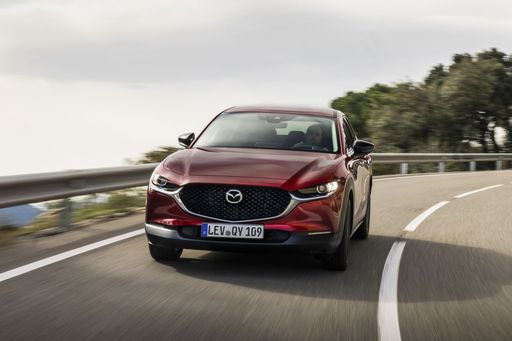 @ de.mazda-press.com
@ de.mazda-press.com
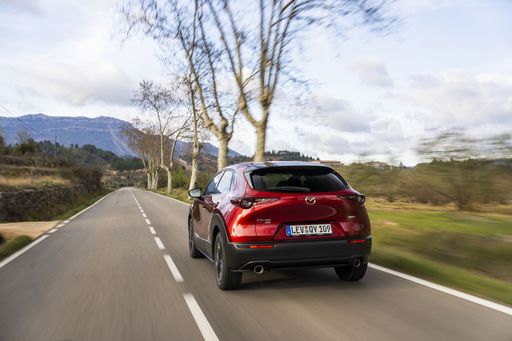 @ de.mazda-press.com
@ de.mazda-press.com
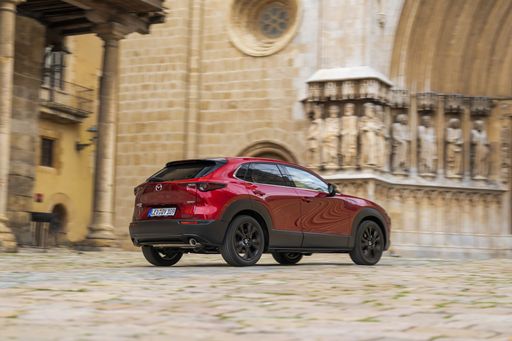 @ de.mazda-press.com
@ de.mazda-press.com
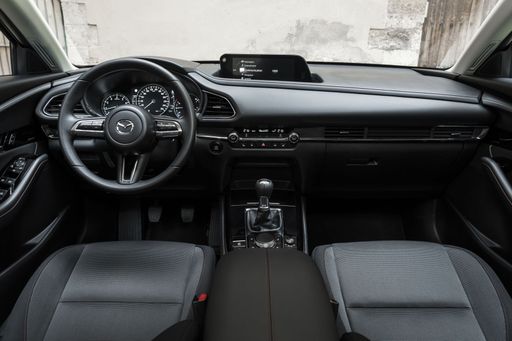 @ de.mazda-press.com
@ de.mazda-press.com
Toyota bZ4X
The Toyota bZ4X represents a bold step forward in the brand's commitment to electric mobility, showcasing an innovative design that merges futuristic aesthetics and functionality. Inside, the spacious cabin is thoughtfully crafted to provide comfort and advanced technology, ensuring a pleasurable driving experience. With its impressive range and sustainable vision, the bZ4X sets a new benchmark for environmentally conscious driving without compromising on performance or style.
details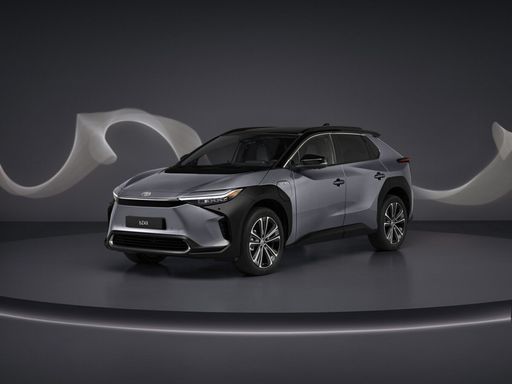 @ Toyota
@ Toyota
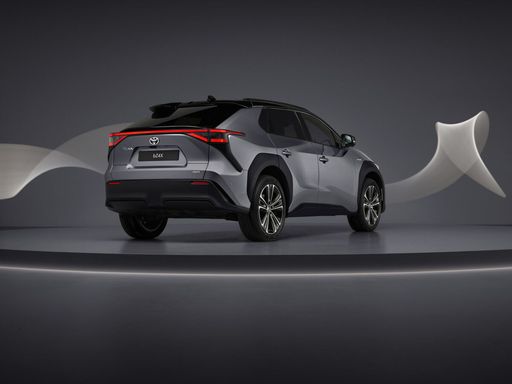 @ Toyota
@ Toyota
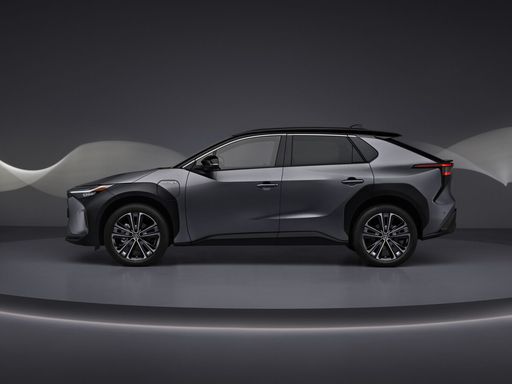 @ Toyota
@ Toyota
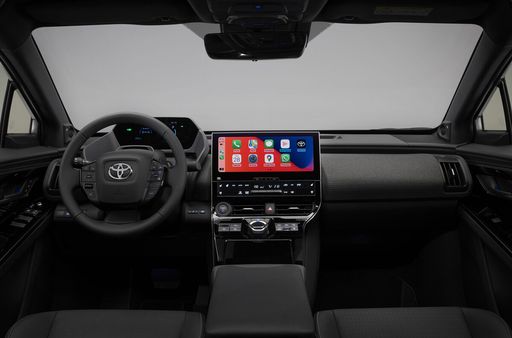 @ Toyota
@ Toyota
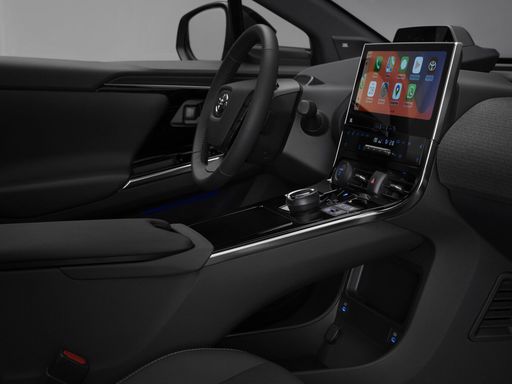 @ Toyota
@ Toyota
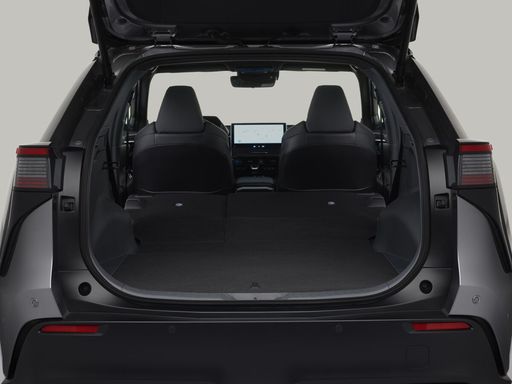 @ Toyota
@ Toyota

|

|
|
|
|
Costs and Consumption |
|
|---|---|
|
Price
30800 - 37100 £
|
Price
36800 - 45400 £
|
|
Consumption L/100km
-
|
Consumption L/100km
-
|
|
Consumption kWh/100km
18.30 kWh
|
Consumption kWh/100km
14.4 - 16.2 kWh
|
|
Electric Range
85 km
|
Electric Range
461 - 513 km
|
|
Battery Capacity
-
|
Battery Capacity
-
|
|
co2
22 g/km
|
co2
0 g/km
|
|
Fuel tank capacity
-
|
Fuel tank capacity
-
|
Dimensions and Body |
|
|---|---|
|
Body Type
SUV
|
Body Type
SUV
|
|
Seats
5
|
Seats
5
|
|
Doors
5
|
Doors
5
|
|
Curb weight
1849 kg
|
Curb weight
1970 - 2085 kg
|
|
Trunk capacity
332 - 350 L
|
Trunk capacity
452 L
|
|
Length
4395 mm
|
Length
4690 mm
|
|
Width
1848 mm
|
Width
1860 mm
|
|
Height
1555 mm
|
Height
1600 mm
|
|
Payload
402 kg
|
Payload
465 - 495 kg
|
Engine and Performance |
|
|---|---|
|
Engine Type
Plugin Hybrid
|
Engine Type
Electric
|
|
Transmission
Automatic
|
Transmission
Automatic
|
|
Transmission Detail
-
|
Transmission Detail
-
|
|
Drive Type
Front-Wheel Drive
|
Drive Type
Front-Wheel Drive, All-Wheel Drive
|
|
Power HP
170 HP
|
Power HP
204 - 218 HP
|
|
Acceleration 0-100km/h
9.10 s
|
Acceleration 0-100km/h
6.9 - 7.5 s
|
|
Max Speed
140 km/h
|
Max Speed
160 km/h
|
|
Torque
-
|
Torque
265 - 336 Nm
|
|
Number of Cylinders
-
|
Number of Cylinders
-
|
|
Power kW
125 kW
|
Power kW
150 - 160 kW
|
|
Engine capacity
830 cm3
|
Engine capacity
-
|
General |
|
|---|---|
|
Model Year
2025
|
Model Year
2024 - 2025
|
|
CO2 Efficiency Class
B
|
CO2 Efficiency Class
A
|
|
Brand
Mazda
|
Brand
Toyota
|
Mazda MX-30
The Electric Revolution: Mazda MX-30
The Mazda MX-30 represents a bold leap into the realm of sustainable mobility, bringing a distinct blend of style, efficiency, and innovation. As Mazda's first all-electric vehicle, the MX-30 is designed to capture the hearts of eco-conscious drivers while delivering the fun driving experience the brand is known for. Let’s delve into what makes this vehicle stand out in the increasingly crowded electric vehicle market.
Sleek Design Meets Practicality
The MX-30 is a compact SUV that exudes a modern aesthetic with its clean lines and contemporary silhouette. Measuring 4,395 mm in length and 1,848 mm in width, the MX-30 is designed to navigate city streets with ease. Its unique freestyle doors facilitate easy access to the front and rear seats, accommodating up to five passengers comfortably.
Advanced Electric Powertrain
At the heart of the MX-30 is Mazda's e-SKYACTIV drivetrain, available in both fully electric and plug-in hybrid variants. The electric version delivers a respectable 145 PS (107 kW), whereas the plug-in hybrid offers an enhanced 170 PS (125 kW). Both versions employ front-wheel drive with a single-speed reduction gearbox, ensuring a smooth and responsive ride.
Efficiency and Range
The MX-30 showcases commendable efficiency with a power consumption ranging from 17.5 to 17.9 kWh per 100 km. Drivers can expect a maximum electric range of 200 km for the fully electric model, while the plug-in hybrid offers 85 km on electric power alone. This ensures the MX-30 is well-suited for both daily commutes and extended journeys.
Elegant Interiors and Cutting-Edge Technology
Inside, the MX-30 presents a zen-like cabin featuring sustainable materials like cork and recycled fabrics, reinforcing Mazda’s commitment to environmental consciousness. The vehicle comes equipped with a host of technological advancements, including a digital dashboard and a user-friendly infotainment system that keeps drivers connected and informed on the go.
Performance and Handling
Mazda's dedication to driving pleasure continues with the MX-30. With an acceleration time from 0-100 km/h between 9.1 to 9.7 seconds and a top speed of 140 km/h, it promises an engaging drive. The low centre of gravity, courtesy of the battery placement, and its precise steering ensure the MX-30 feels agile and responsive, whether navigating urban environments or open roads.
Safety and Features
Safety is paramount in the MX-30, which boasts an array of advanced features, including collision avoidance systems and a reinforced body structure. It also scores well on CO2-efficiency, rated between Class A and B, making it a responsible choice for eco-minded consumers.
Conclusion: Mazda MX-30 – A Vision of the Future
In conclusion, the Mazda MX-30 is a testament to the brand's innovative spirit and commitment to sustainability. With its combination of striking design, efficient powertrains, and cutting-edge technology, the MX-30 is a formidable competitor in the electric vehicle market. Offering a blend of sophistication and performance, it is poised to win over motorists who seek an environmentally friendly vehicle without compromising on driving joy.
Toyota bZ4X
A New Era with the All-Electric Toyota bZ4X
The Toyota bZ4X is a groundbreaking addition to the world of electric vehicles. This 2024 SUV promises to combine cutting-edge technology, an environmentally friendly powertrain, and exquisite design, representing Toyota's ambitious journey towards a sustainable future. Let's delve into its technical highlights and revolutionary innovations.
Performance and Efficiency
The Toyota bZ4X is available with two powertrain options: front-wheel drive and all-wheel drive. The front-wheel-drive model boasts a power output of 204 PS (150 kW), while the all-wheel-drive variant offers slightly more power at 218 PS (160 kW). Both setups utilise an efficient reduction gear transmission, allowing for smooth acceleration and optimal power delivery.
In terms of energy consumption, the bZ4X demonstrates impressive efficiency. The front-wheel-drive variants consume 14.4 kWh/100 km, whereas the all-wheel-drive versions utilise 16.2 kWh/100 km. This efficiency translates to an electric range of 461 to 513 km, positioning the bZ4X as a formidable competitor in the electric SUV market.
Innovative Design and Comfort
Emphasising design and passenger comfort, the Toyota bZ4X presents a spacious interior that accommodates five passengers comfortably. With a length of 4690 mm, a width of 1860 mm, and a height of 1600 mm, the bZ4X provides generous headroom and legroom, along with a practical boot capacity of 452 litres.
Available in multiple trim levels, including Comfort, Lounge, and Team Deutschland, each model offers a host of advanced features designed to enhance the driving experience. From intuitive infotainment systems to luxurious upholstery, the bZ4X prioritises driver satisfaction and convenience.
Technological Advancements
The Toyota bZ4X is equipped with state-of-the-art technology that enhances both safety and driving pleasure. It includes a full suite of driver assistance systems and cutting-edge connectivity features. Toyota's dedication to safety is further exemplified by the car's superior build quality and a CO2-efficiency class of A, ensuring zero emissions during operation.
Ready for the Future
As environmental concerns continue to shape the automotive industry, the Toyota bZ4X stands out as a remarkable response to these challenges. With pricing ranging from €42,900 to €52,990, this model ensures that eco-conscious consumers do not have to compromise on performance, technology, or style.
The Toyota bZ4X not only embodies the brand’s commitment to a sustainable future but also sets a new benchmark for what electric SUVs can achieve. Its combination of robust performance, innovative design, and environmental efficiency signifies a promising step forward in the realm of electric mobility.
The prices and data displayed are estimates based on German list prices and may vary by country. This information is not legally binding.
